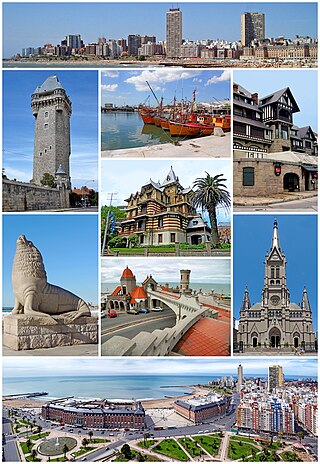
Mar del Plata is a city on the coast of the Atlantic Ocean, in Buenos Aires Province, Argentina. It is the seat of General Pueyrredón district. Mar del Plata is the second largest city in Buenos Aires Province. The name "Mar del Plata" is a shortening of "Mar del Rio de la Plata," and has the meaning of "sea of the Rio de la Plata basin" or "adjoining sea to the (River) Plate region". Mar del Plata is one of the major fishing ports and the biggest seaside beach resort in Argentina. With a population of 682,605 as per the 2022 census [INDEC], it is the 5th largest city in Argentina.

La Plata is the capital city of Buenos Aires Province, Argentina. According to the 2022 census, the Partido has a population of 772,618 and its metropolitan area, the Greater La Plata, has 938,287 inhabitants. It is located 9 kilometers inland from the southern shore of the Río de la Plata estuary.

Lost Embrace is a 2004 internationally co-produced comedy-drama film, directed by Daniel Burman and written by Burman and Marcelo Birmajer. The film features Daniel Hendler, Adriana Aizemberg, Jorge D'Elía, among others.
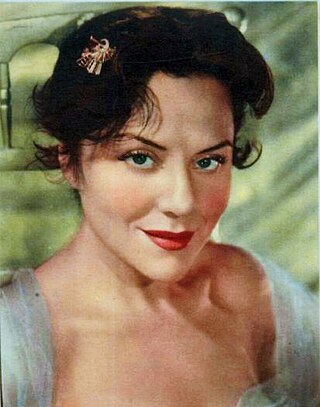
Amelia Bence was an Argentine film actress and one of the divas of the Golden Age of Argentine Cinema (1940–1960).

Zwi Migdal was a criminal organisation founded by Jews in Poland in the 19th century, based mainly in Argentina.
"My Yiddishe Momme" is a song written by Jack Yellen and Lew Pollack (music), first recorded by Willie Howard, and was made famous in vaudeville by Belle Baker and by Sophie Tucker, and later by the Barry Sisters. Tucker began singing My Yiddishe Momme in 1925, after the death of her own mother. She later dedicated her autobiography Some of These Days to Yellen, "A grand song writer, and a grander friend". Sophie Tucker made 'Mama' a top 5 U.S. hit in 1928, English on one side and Yiddish on the B-side. Leo Fuld combined both in one track and made it a hit in the rest of the world." It was the signature song of British comedian Issy Bonn.
Golde Flami was an Argentine actress of film, television and stage.

Pedro Benoit was an Argentine architect, engineer, and urbanist best known for designing the layout of La Plata City.
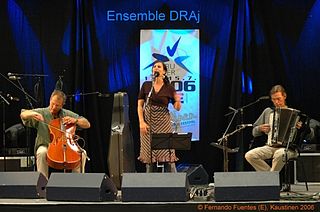
Ensemble DRAj is a German Klezmer group dedicated to arranging and presenting songs in Yiddish. The term “draj” is the Yiddish translation of the German word “drei”.
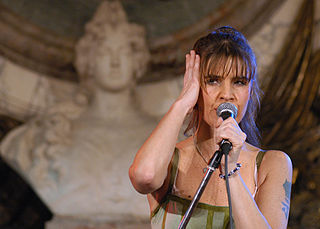
Fabiana Cantilo is an Argentine singer-songwriter. She has sold more than 6 million records in her career.

Isabelle Yakovlevna Kremer was a soprano of Russian Jewish descent who at various times of her life held citizenship in Russia, the United States, and Argentina. She first drew notice as a teenager for her revolutionary poetry which was published in an Odessa newspaper. She began her professional singing career as an opera singer in Europe during the second decade of the 20th century. By the time of her relocation to the United States in 1924, she had abandoned her opera career in favor of performing as a concert soloist and recitalist.
Moshe Dluznowsky (Dunow) (Polish: Mojżesz "Moszek" Dłużnowski, Yiddish: משה דלושנאָװסקי, 1903–1977), was a Polish-born journalist, publicist, writer, dramatist, and editor of the journal Tomashover Vokhenblat.

Olinda Bozán was an Argentine film actress and comedian of the Golden Age of Argentine Cinema (1940–1960). Born into a circus family, she acted on the vaudeville circuit, and performed in silent and sound movies. She was trained by the Podestá brothers, one of whom she married, who have one of the most prestigious Argentine acting awards named for them. Bozán' appeared in 75 films and was considered one of the best comic actors of Argentine cinema in the 20th century.
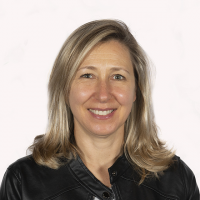
Myriam Bregman is an Argentine lawyer, activist, and politician. Raised in a Jewish family, Bregman joined the Socialist Workers' Party (PTS) – a Trotskyist Argentine party of which she is among the most prominent members – while studying a degree in law at the University of Buenos Aires in the 90s.

María Angélica Barreda became in 1910 the first woman admitted to practice law in Argentina. She graduated from the National University of La Plata, receiving her degree on 28 December 1909.
Agustina Gorzelany is an Argentine field hockey player. She plays for Club San Martín and the Argentina national team, winning a silver medal at the 2020 Summer Olympics.

Florence Weiss was a Russian-born American Yiddish theatre, Vaudeville and film actor, recording artist, and soprano who was active from the 1920s to the 1960s. She worked and performed with such artists as Moishe Oysher, Alexander Olshanetsky, Boris Thomashefsky, Fyvush Finkel, and Abe Ellstein. The height of her popularity was during the 1930s, when she often toured and performed with her then-husband, Moishe Oysher, and appeared in three Yiddish-language films with him: The Cantor's Son, The Singing Blacksmith, and Overture to Glory.

David Meyerowitz was a Latvian-born composer active in the early Yiddish theater. His music was oriented mainly to vaudeville and revue formats.

Clara Gold was an American Yiddish theatre actor and recording artist. She recorded more than twenty Yiddish theatre music and comedy discs between 1917 and 1929, usually with comedic partner Gus Goldstein.

Romina Ricci is an Argentine actress, screenwriter and film director.














